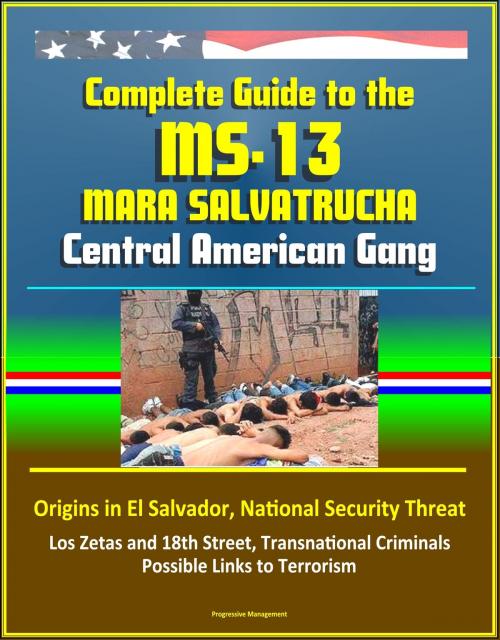Complete Guide to the MS-13 Mara Salvatrucha Central American Gang: Origins in El Salvador, National Security Threat, Los Zetas and 18th Street, Transnational Criminals, Possible Links to Terrorism
Nonfiction, Social & Cultural Studies, True Crime| Author: | Progressive Management | ISBN: | 9781370205554 |
| Publisher: | Progressive Management | Publication: | April 22, 2017 |
| Imprint: | Smashwords Edition | Language: | English |
| Author: | Progressive Management |
| ISBN: | 9781370205554 |
| Publisher: | Progressive Management |
| Publication: | April 22, 2017 |
| Imprint: | Smashwords Edition |
| Language: | English |
This is an authoritative compilation of ten major documents and reports dealing with the MS-13 Mara Salvatrucha Central American gang and related criminal enterprises, including updated information on gang activity across America. Each report is professionally converted for accurate flowing-text ebook format reproduction.
Contents: Mara Salvatrucha Street Gang: An International Criminal Enterprise with Roots in El Salvador's Civil War * How is MS-13 a Threat to U.S. National Security? * Going Global on Gangs: New Partnership Targets MS-13 * The MS-13 and 18th Street Gangs: Emerging Transnational Gang Threats? * Gangs in Central America * Los Zetas and MS-13: Nontraditional Alliances * Escalating Violence in El Salvador * The Likelihood of Collaboration Between Central American Transnational Gangs and Terrorist Organizations * Defining Mara Salvatrucha's Texas Network * Central America and Mexico Gang Assessment
Rising crime is threatening democratic development and slowing economic growth across Central America and Mexico. Gang activity has transcended the borders of Central America, Mexico, and the United States and evolved into a transnational concern that demands a coordinated, multi-national response to effectively combat increasingly sophisticated criminal gang networks. Whereas gang activity used to be territorially confined to local neighborhoods, globalization, sophisticated communications technologies, and travel patterns have facilitated the expansion of gang activity across neighborhoods, cities, and countries. The monikers of notorious gangs such as Mara Salvatrucha (MS-13) and the 18th Street gang (Barrio 18) now appear in communities throughout the United States, Central America, and Mexico. Members of these international gangs move fluidly in and out of these neighboring countries. The U.S. Congress has recognized that some gangs in Latin America and the United States are international criminal organizations whose criminal activities in the Americas have damaging effects on national security by increasing domestic crime levels and facilitating drug trafficking.
The federal response to the MS-13 and M-18 gang problem has largely involved the enforcement of criminal and immigration laws, including the deportation of alien gang members. More recently, federal efforts have focused on prosecuting gang members under the Racketeer Influence and Corrupt Organizations (RICO) statute. Deported alien gang members have established MS-13 and M-18 gang cliques in their home countries, and some experts suggest that U.S. deportation policies have effectively transported U.S.-styled gang culture to parts of Central America and Mexico. Moreover, evidence shows that deported alien MS-13 and M-18 gang members have established a "revolving door" migratory pattern of repeat illegal reentry into the United States, raising concerns that these "migratory" alien gang members may become involved in narco-trafficking, smuggling, and other criminal activities along the U.S.-Mexico border.
This is an authoritative compilation of ten major documents and reports dealing with the MS-13 Mara Salvatrucha Central American gang and related criminal enterprises, including updated information on gang activity across America. Each report is professionally converted for accurate flowing-text ebook format reproduction.
Contents: Mara Salvatrucha Street Gang: An International Criminal Enterprise with Roots in El Salvador's Civil War * How is MS-13 a Threat to U.S. National Security? * Going Global on Gangs: New Partnership Targets MS-13 * The MS-13 and 18th Street Gangs: Emerging Transnational Gang Threats? * Gangs in Central America * Los Zetas and MS-13: Nontraditional Alliances * Escalating Violence in El Salvador * The Likelihood of Collaboration Between Central American Transnational Gangs and Terrorist Organizations * Defining Mara Salvatrucha's Texas Network * Central America and Mexico Gang Assessment
Rising crime is threatening democratic development and slowing economic growth across Central America and Mexico. Gang activity has transcended the borders of Central America, Mexico, and the United States and evolved into a transnational concern that demands a coordinated, multi-national response to effectively combat increasingly sophisticated criminal gang networks. Whereas gang activity used to be territorially confined to local neighborhoods, globalization, sophisticated communications technologies, and travel patterns have facilitated the expansion of gang activity across neighborhoods, cities, and countries. The monikers of notorious gangs such as Mara Salvatrucha (MS-13) and the 18th Street gang (Barrio 18) now appear in communities throughout the United States, Central America, and Mexico. Members of these international gangs move fluidly in and out of these neighboring countries. The U.S. Congress has recognized that some gangs in Latin America and the United States are international criminal organizations whose criminal activities in the Americas have damaging effects on national security by increasing domestic crime levels and facilitating drug trafficking.
The federal response to the MS-13 and M-18 gang problem has largely involved the enforcement of criminal and immigration laws, including the deportation of alien gang members. More recently, federal efforts have focused on prosecuting gang members under the Racketeer Influence and Corrupt Organizations (RICO) statute. Deported alien gang members have established MS-13 and M-18 gang cliques in their home countries, and some experts suggest that U.S. deportation policies have effectively transported U.S.-styled gang culture to parts of Central America and Mexico. Moreover, evidence shows that deported alien MS-13 and M-18 gang members have established a "revolving door" migratory pattern of repeat illegal reentry into the United States, raising concerns that these "migratory" alien gang members may become involved in narco-trafficking, smuggling, and other criminal activities along the U.S.-Mexico border.















